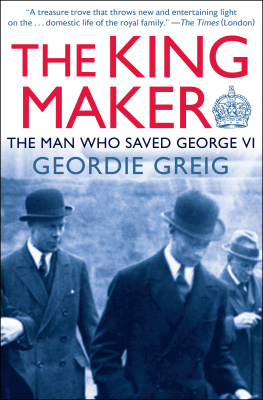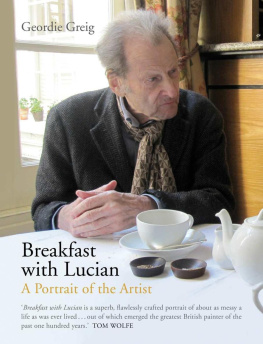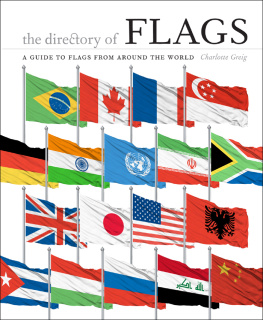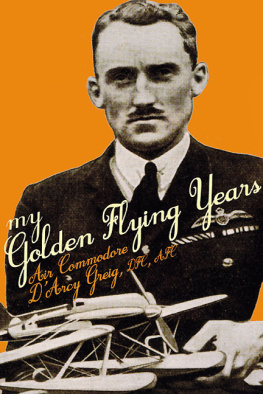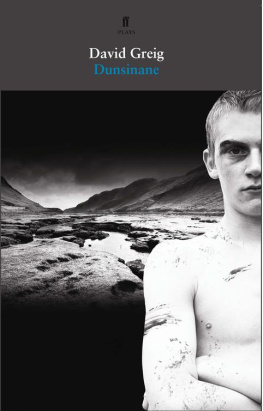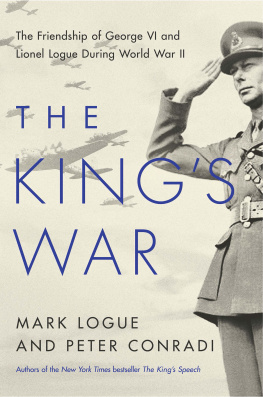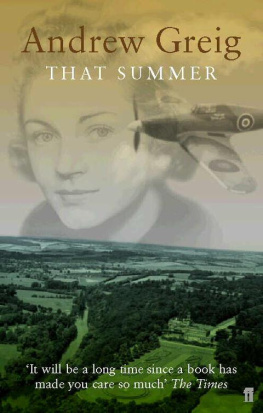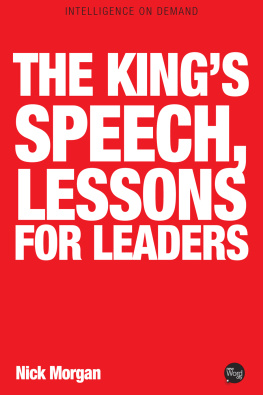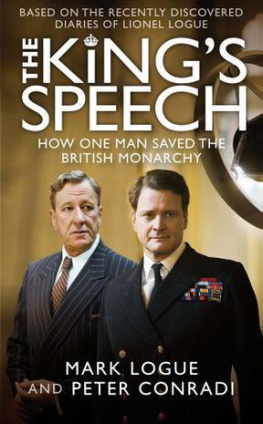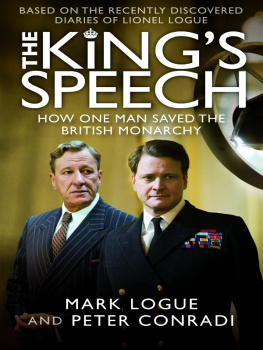All rights reserved, including without limitation the right to reproduce this ebook or any portion thereof in any form or by any means, whether electronic or mechanical, now known or hereinafter invented, without the express written permission of the publisher.
Copyright 1999, 2013 by Geordie Greig
Cover design by Open Road Integrated Media
ISBN: 978-1-4976-2901-1
This edition published in 2014 by Open Road Integrated Media, Inc.
180 Maiden Lane
New York, NY 10038
www.openroadmedia.com

THE KING MAKER
The Man Who Saved George VI
Geordie Greig

For Kathryn and
Jasper, Monica and Octavia
In memory of
H.L.C. Greig (1925-2012)
Foreword
The friendship of Louis Greig, a Glaswegian naval doctor, with Prince Albert, played a pivotal part in the dramatic transformation of this hapless hesitant prince into George VI, last British King and Emperor.
In the film The Kings Speech, another doctor, the Australian speech therapist Lionel Logue, was shown helping George Vs buttoned-up younger son to overcome his stammer. Both of these men helped to loosen somewhat their royal charges straitjacket of obligations, and both, significantly, were charismatic outsiders to court life. But Louis Greig was the first to sow the seeds of change.
Louis had been a sporting hero, a Scottish rugby captain, singled out by the king to inject fortitude into young Alberts character. He was later credited by courtiers as being the man who made the King, and his legacy endures; in 2001 Queen Elizabeth interlinked the fingers of her two hands as she emphasised to me the importance of the relationship between her father and my grandfather: They were so close, so close, she said.
Their friendship was formed during the First World War when Albert was unfairly derided for constantly being ill. In desperation George V summoned Louis to Buckingham Palace.
What would you do if he was your son? he asked this bluff naval surgeon who had worked in the slums of Glasgow. I would operate, Louis replied, a response that contrasted vividly with the cautious attitude of the royal households doctors.
Our present queens grandfather, George V generously credited Louis with saving Alberts life. His decisive medical advice led to a successful emergency operation for a stomach ulcer, carried out in Buckingham Palace on a wooden table. Afterwards Prince Albert would write often to his father, Can I bring Greig with me? George V always agreed.
Louis and Albert had met before, when Louis treated the prince as a 13-year-old naval cadet. But now Louis found his own life completely interwoven with that of his royal charge. He eventually became Alberts private secretary and their professional relationship and friendship continued after Alberts marriage in 1923; Louis was by then deemed indispensable. On Alberts honeymoon night, George V had written to his son telling him how lucky he was to have Lady Elizabeth Bowes-Lyon, but also how fortunate he was to have Louis Greig.
But Louis and the royal couple eventually realised that there could only be one person at a time putting steel into the kings character. That person should now be Elizabeth. She took over the role from Louis, although George V and Queen Mary were initially aghast that the kings loyal mentor and friend was to be cut loose from the inner circle. For so many years he had injected confidence and zest, as well as broadening the kings social horizons. Their friendship had caught the public imagination, particularly when they played tennis doubles at Wimbledon. This remains the only time a member of the royal family has ever played in the All-England tennis tournament.
But Louiss most long-lasting legacy was in acting as a Cupid figure in Alberts wooing of Elizabeth, who acknowledged Louiss role later, when she had become Queen Mother. George V was especially grateful, giving Louis a grace-andfavour house and making him a lifelong courtier.
But shortly after Albert was married his full-on, full-time professional role was over. After her marriage to Albert, Elizabeth undoubtedly took the major role in developing him into the courageous monarch he became, but Louis had also played a key part. Under the influence of both individuals, George VI became a modest and resolute force for good, doing what he thought was the right thing, and in the process becoming a king well-made.
Prologue
The sporting side of the London Season has presented features of unusual interest this year. The Wimbledon Lawn Tennis Championships are always an important social fixture and the Duke of Yorks interest in lawn tennis has this year resulted in H.R.H. entering the doubles at Wimbledon with Wing Commander Greiga partnership which won the RAF Doubles in 1920. The fact that a Prince of the Reigning House is competing adds tremendously to the Wimbledon interest.
Illustrated London News, 19 June 1926
In the year of the General Strike a lesser wind of change blew through Buckingham Palace. Louis Greig and Prince Albert, the Duke of York, entered the 1926 doubles competition at Wimbledon, which was the first time a member of the royal family had played in the All-England tennis tournament.
King George Vs second son was thirty-one years old and cut an elegant, athletic figure in his long white trousers and short-sleeved flannel shirt when he strolled on to Number Two Court on Friday, 25 June, in the golden jubilee year of the lawn tennis championships. He was slightly built, his short brown hair slicked back and divided in a sharp parting. His movements were wooden, and he radiated a sense of anxiety. Louis Greig was fourteen years older, but extraordinarily fit for a forty-five-year-old. The taller, broad-shouldered Scot had a monkish pate, a weathered and tanned face framing intensely focused blue eyes. Usually they glinted with humour or mischief, but, on this occasion, they were locked on to his partner. Louis had taught the Prince how to play tennis, and felt responsible for his protgs performance in so public a forum.
Albert feared that they might be completely outclassed by their opponents in the worlds most famous tennis tournament, as they never had played in front of such a large crowd. He had forbidden the publicity-conscious Wimbledon committee from scheduling the match on the Centre Court, instead asking for a discreetly placed outer court. Number Two Court had been the compromise. Not only was Albert apprehensive about his game, but he was, also, nervous about the recent political and industrial unrest. The preceding weeks had been marked by the long-drawn-out coal strike that had divided the nation. The miners had been told to accept a pay cut or face the sack. When confronted with a national lockout, the Trades Union Congress called a General Strike which started on 3 May and lasted twelve days. It collapsed after extraordinary interventions, voluntary work and a loss of nerve by the TUC, but it had still established a new political climate, and Albert did not want to seem too light-hearted or frivolous at such a sensitive time.
On that warm June afternoon, newspaper photographers and reporters at Wimbledon focused their attention on Alberts wife, the Duchess of York. She was small and dark-haired with a winning smile. Unfettered by fashion, she wore her hair in an unbecoming fringe and dressed picturesquely in her own distinctive style. The trademark fox fur round her neck caught the attention of the novelist Muriel Spark, who used it in
Next page
